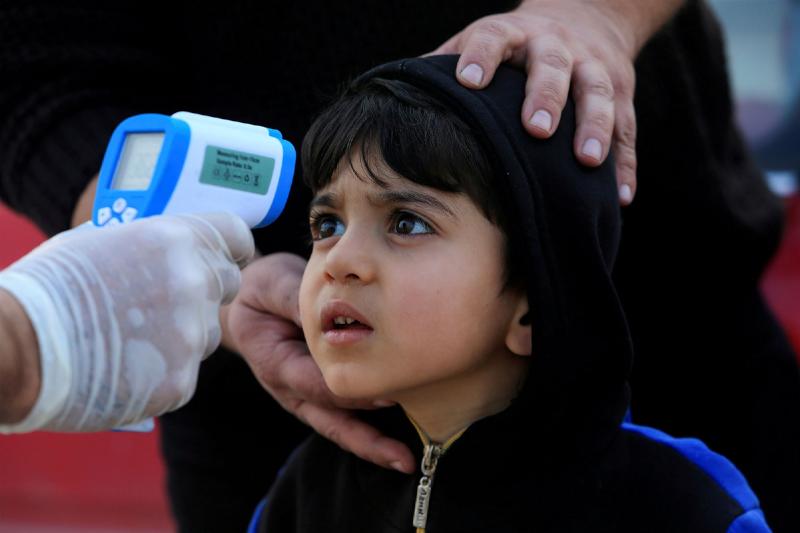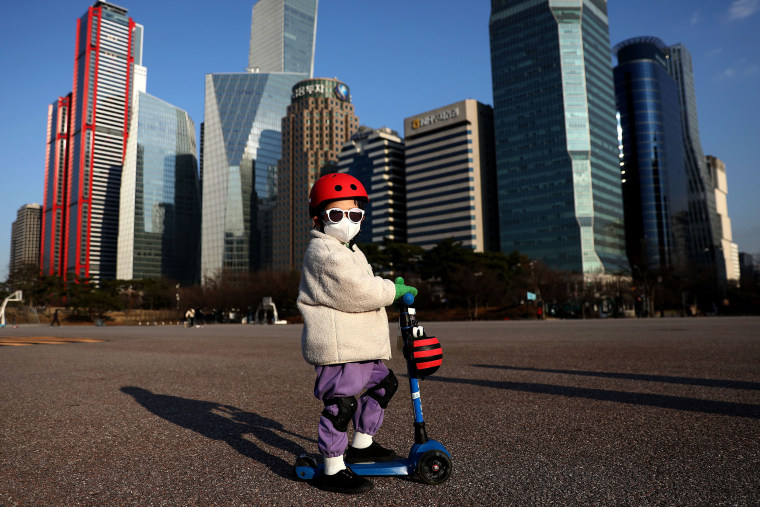'We simply do not understand why': Coronavirus is sparing children, puzzling experts
Category: Health, Science & Technology
Via: perrie-halpern • 5 years ago • 3 commentsBy: Elizabeth Chuck




As the novel coronavirus spreads around the globe, sickening more than 90,000 people and killing about 3,000, doctors have noticed something curious: Very few children have been diagnosed with it. And of those who have, most have had mild cases.
In China, where the outbreak started, children comprise just 2.4 percent of all reported cases of COVID-19, the illness caused by the new coronavirus, a World Health Organization-China Joint Mission report from last month found. Of those, only a sliver — 2.5 percent — experienced severe symptoms, and an even tinier proportion — 0.2 percent — became critically ill. Worldwide, there have been no deaths reported so far in young children.
The coronavirus' mercy on children is a relief and a mystery to pediatric infectious diseases experts, who have a handful of working theories but no definitive answers for why.
"This is one of the unusual findings and curveballs that this virus keeps throwing at us," said Dr. Frank Esper, a pediatric infectious diseases specialist at Cleveland Clinic Children's, whose research focuses on viral respiratory infections and newly recognized infectious diseases. "Normal coronaviruses seem to affect children and adults equally, but this one, for whatever reason, certainly skews more to the adult population."
The answer may lie in the difference between children's and adult's immune systems, said Dr. Vanessa Raabe, an assistant professor in pediatric and adult infectious diseases at NYU Langone. As people age, their immune systems weaken, she said, potentially making it harder for them to fight off illnesses.
"We've seen similar patterns for other diseases — chickenpox, for example. Adults who get it tend to get much more severe cases than children."
"We've seen similar patterns for other diseases — chickenpox, for example. Adults who get it tend to get much more severe cases than children," she said.
There are other possible explanations. Children, who are typically bombarded with certain other coronaviruses, such as the ones that cause the common cold, may have antibodies in their bloodstream from exposure to those that offers some cross-protection for this virus, said Dr. Buddy Creech, an associate professor of pediatric infectious diseases at Vanderbilt Children's Hospital.
"Kids with this novel coronavirus, maybe they are responding like they would any other coronavirus, where they get a little runny nose, a little cough, or very mild symptoms, because they have seen coronavirus before, and maybe that provides them a little more protection," he said.
Or, Creech said, children's immune responses might be more tempered than that of adults, which he said may be going "haywire" in response to the new illness.
"Kids are really good at making good, fast immune responses."
"Children's immune systems are used to being assaulted constantly, so it's to their benefit to coordinate and regulate their response," he said. "At the end of the day, if they freaked out about every single virus every time, they would be in the ICU. Instead, kids are really good at making good, fast immune responses."
There has yet to be any definitive sign that the theories pan out, though, Creech added.

"We simply do not understand why kids have been spared," he said.
Initially, experts thought children were tolerating the new coronavirus better because they had healthier lungs that had been exposed to less cigarette smoke and pollutants than adults had, especially in China, where air quality is a known problem. Smoking in particular raises the amount of a particular receptor in the lungs that other coronaviruses, like the severe acute respiratory syndrome, or SARS, attaches to, so medical professionals wondered if having more of that receptor was leading to a higher likeliness of getting the illness — or getting it more severely.
But as the virus spread, that theory didn't necessarily hold.
"The problem is we're still seeing this age-relatedness, where the most severe disease is related to age, outside of China," Esper said.
Experts then questioned whether children simply were not getting exposed as frequently. With SARS, the virus stayed within certain populations, particularly hospitals, Creech said.
But with the new coronavirus, "the virus seems to be transmitted just fine, and it still appears that younger kids under 10 to 15 years of age simply aren't getting disease, or if they are, they're not getting too many symptoms," Creech said.
This does not mean that children can't transmit the virus to other, more vulnerable members of the community. As testing becomes more widely available in the United States, more cases in children are likely to be detected, according to Esper.
"Right now, we unfortunately just can’t tell you exactly why kids are faring better. What's their secret to their success? We’re just happy they do have success against this particular virus," Esper said. "But that doesn't mean your child or any other child is not going to get sick, and it doesn't mean they can't get infected and spread the infection to other people who can get more sick."
Even newborns seem to be tolerating the virus fairly well: One study found that in China, only nine infants were hospitalized with it between Dec. 8 and Feb. 6. None had severe complications or required intensive care.
(Despite promising signs that children are fending off the new virus well, the experts caution that premature infants and children with underlying chronic health conditions should be considered high-risk for developing complications.)
In general, children have not been susceptible to past coronavirus outbreaks, either. SARS and the Middle East respiratory syndrome, or MERS, infections were "relatively uncommon" among children, according to the Centers for Disease Control and Prevention , which advises children and their families to take preventative measures nonetheless, such as washing hands with soap and water or alcohol-based hand sanitizer, and covering your mouth when you cough.
If children do feel ill, Esper said, parents should monitor them closely and protect others around them to make sure they don't pass the infection on to friends and family.
That's one reason why some schools around the country may opt to close if there are cases identified within their community, he added.
"Just because we haven't seen that childhood disease, doesn't mean we want to trust our luck and roll the dice with it," he said. "And also, it's not just the children in the schools, but there are also adults that may be more at risk."
In the meantime, experts hope the immunity children are displaying will give them more clues about how the novel coronavirus behaves.
"It's something we really want to know. What is it about some people that makes them get mild or no symptoms, and some people get really sick?" Raabe said. "If parents and children are willing to be involved in research, we will have an opportunity to learn about this."
Tags
Who is online
42 visitors

I believe the reason is mostly because of the body's immune system. I always had a strong immune system, able to resist many illnesses with which I came in contact, but I'm also aware that it is declining with my advanced age, and that fatality is more likely at my age in the 80s, so I have to be super careful. The schools here have not opened, and I don't expect them to open for some time.
The novel coronavirus is related to the common cold and flu and these are viruses that children get all the time. As an adult I have only had the flue a few times and I might catch cold once a decade but when I was a kid I caught the flu almost every year and had colds all the time. Schools and Kids are the germiest things on earth, shared bathrooms, desks, toys, lunchrooms, even the pencil sharpener is a communal germ spreader. Little kids are the worse though with their teachers telling them to hold hands and share but even older kids get told to pass all those germ encrusted papers forward to the front of the class. As bad as it is it works out a child's immune system like a Bower in training so while they may catch these viruses their immune system fights them of like a well oiled machine. Compare that to us older folks who always take precautions and wash our hands, we never shake hands with the guy with the cold. Yesterday I went to Walmart and I was turning down an aisle and there was a woman coughing badly so I skipped that aisle. It may have protected me then but in the long run it may make me more susceptible to these viruses in general.
The more we know, the less we seem to know.
Study reveals sharp increase in COVID-19 in kids in Shenzhen
I've said this earlier... unless everyone is tested simultaneously we do not know the full extent. That's not going to happen, imo. But as we increase testing we may come across more and more people which have covid-19 and are not displaying any severe symptons.
Kids and coronavirus: Children have come down with COVID-19, but usually with milder symptoms
It should be noted the 1st 2 deaths in the U.S. due to covid 19 were detected posthumously.
Bottom line is to wash hands frequently, avoid unnecessary contact and try not to become a statistic.